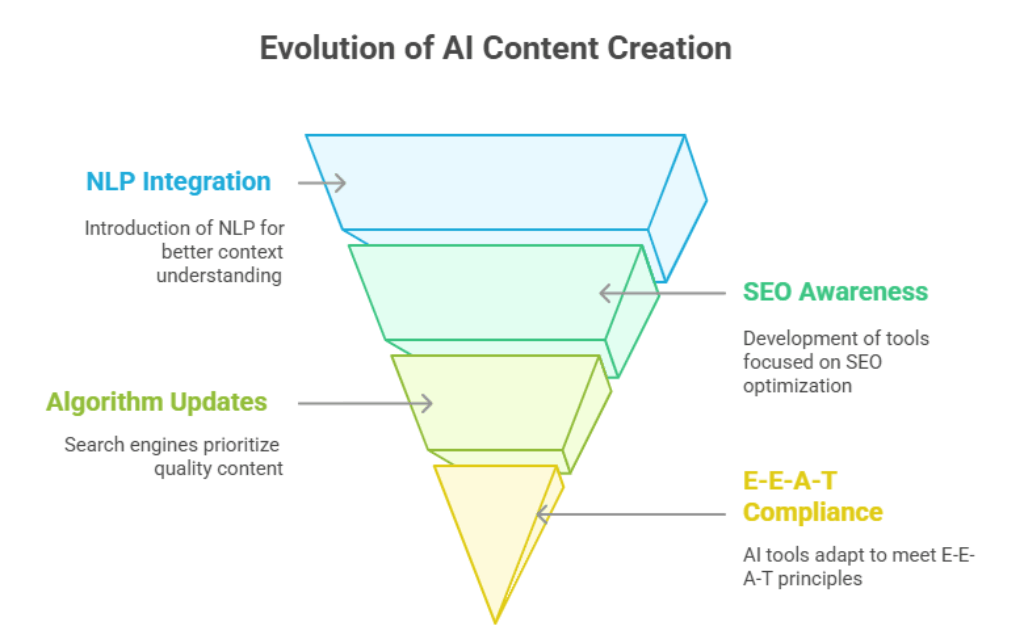SEOWriting.ai is an advanced AI-powered platform that helps bloggers and affiliate marketers create search-optimized content that can rank on both traditional search engines like Google and newer AI-powered search tools like ChatGPT and Perplexity. Unlike basic AI writing tools, SEOWriting.ai integrates real-time SERP analysis, smart keyword placement, brand voice integration, AI image generation, and built-in SEO scoring that guides you as you go.
But is it really the best AI for writing SEO content in 2025?
Since 2012, I’ve been an SEO content writer, and over this period, I’ve used various content writing tools. From basic text generators to sophisticated platforms that claim to understand search engine algorithms. However, in recent years, with the advent of AI writing tools, there has been an explosion of tools promising to revolutionize SEO content creation. But as Google continuously refines its approach to AI-generated content, the standards for what constitutes valuable, rankable content have never been higher.
While for bloggers, content marketers, SEO professionals, and small business owners, the promise of creating optimized content at scale is tantalizing, the question remains:
- Can an AI tool like SEOWriting.ai truly deliver content that not only satisfies search engines but also engages human readers?
- Does it offer capabilities that genuinely set it apart from an increasingly crowded marketplace of competitors?
In this review, I’ll break down everything you need to know about SEOWriting.ai – what it does, how it stacks up against competitors, and whether it deserves the title of “best” AI for writing SEO content in 2025.
So, if you’re a blogger trying to scale content production or an SEO strategist looking for a competitive edge, this guide will give you a clear verdict on whether SEOWriting.ai is worth your time and budget.
Key Takeaways:
- SEOWriting.ai excels at bulk content generation with built-in SEO features.
- Its user-friendly interface and scalability make it ideal for bloggers, small businesses, and SEO agencies.
- It performs well in keyword optimization, readability, and content structure.
- Some limitations include limited customization and occasional generic output.
- It offers competitive pricing with strong value for SEO-focused content strategies.
The Evolution of AI Content Creation

AI writing tools have come a long way since their early days. In the early 2010s, the earliest iterations of content generators were rudimentary, often producing stiff, keyword-stuffed text that lacked nuance and natural flow. These early tools were useful for scaling content but lacked the finesse required for high-quality writing – let alone SEO optimization.
However, the landscape began to shift around the 2020s with the introduction of Natural Language Processing (NLP) and advanced machine learning models, such as GPT-3 and GPT-4. These technologies empowered AI tools to understand better context, intent, and semantics – crucial elements for creating content that appeals to both readers and search engines.
One of the most significant turning points in AI content evolution was the move from basic text generation to SEO-aware content creation. Tools like SEOWriting.ai are now designed to generate content with built-in keyword strategies, content structure suggestions, and semantic optimization. Rather than simply producing readable copy, they aim to create content that ranks. They do this by analyzing top-ranking content, identifying keyword opportunities, and suggesting optimizations based on search intent patterns.
In response to this proliferation of AI-generated content, search engines, particularly Google, launched algorithm updates designed to prioritize quality and user experience. The infamous “helpful content” updates specifically targeted low-value, AI-generated material that prioritized search engines over human readers.
However, over the last few years, Google’s stance on AI-generated content has evolved to focus on “content value signals” rather than how content is created. High-quality AI-generated content that provides genuine value to users and adheres to E-E-A-T principles (Experience, Expertise, Authoritativeness, and Trustworthiness) is acceptable and can rank well. This means AI tools can no longer just sound intelligent – they must deliver relevant, well-organized, and insightful information.
This shift has placed immense pressure on AI writing tools to produce material that reads naturally and satisfies both search algorithms and human readers. And, SEOWriting AI claims to do just that – bridge the gap between automation and effective SEO strategy.
What Makes an AI Writing Tool “The Best” for SEO?
Before we delve into exploring SEOWriting.ai to determine if indeed it’s the best AI writing tool for SEO, we must look, first of all, at what really makes an AI tool the “best.”
As an SEO content writer who has been in this game for over a decade, I do have a few critical elements that I consider when selecting an AI writing tool. These are:
- Content quality
- SEO optimization features
- User-friendliness
- Accuracy, and
- Adaptability to different content formats and industries.
For me, content quality is non-negotiable. High-quality content must be original, engaging, and free of fluff. In my research I’ve noticed that tools that rely on deep-learning models and continuously update their training data tend to produce more reliable output. SEOWriting.ai, for instance, integrates SEO insights into its writing process, ensuring each piece is not only well-written but strategically aligned for visibility.
Equally important for me is the tool’s ability to understand semantic relevance and comprehensive topic coverage. Search engines now evaluate how thoroughly a piece addresses a topic – not just how often it mentions a keyword. This means any AI tool that is worth my consideration must go beyond keyword stuffing and offer contextual depth.
Besides, the SEO tool must support NLP and LSI keyword integration. This helps content mirror how real users search, incorporating related terms and natural phrasing to increase topical authority. Again, SEOWriting.ai includes these capabilities, improving both organic reach and user engagement.
Readability and engagement are another crucial area. For me, SEO writing tools must have the ability to structure content for clarity – using short paragraphs, bullet points, subheadings, and easy navigation. They should also encourage natural flow and tone to keep readers on the page longer.
Finally, a top-tier SEO AI writer must align with Google’s ranking factors: optimized metadata, relevant headings, fast-loading pages, and clear topic signals.
While these might be different from what you have in mind, I can categorically say that from my experience, these elements collectively determine whether content will rank well and deliver value.
What Is SEOWriting.ai?

Let’s now take a look at the SEOWriting.ai tool. What it is and what it does.
SEOWriting.ai is an AI-powered content creation platform built specifically to generate search-engine-optimized content at scale. Launched in 2023 and significantly upgraded in 2025, this platform stands out for its focused approach to generating content designed to rank well in search results while maintaining readability and engagement. Unlike general-purpose writing tools like Chatgpt, SEOWriting.ai focuses on helping bloggers, content marketers, and SEO professionals produce high-ranking, long-form content quickly and efficiently.
One of its standout features is bulk content generation – perfect for agencies or niche site owners managing multiple projects. Users can input a list of keywords and get dozens of SEO-optimized blog posts generated in minutes. The platform also offers real-time SEO optimization tools that suggest improvements based on target keywords, readability scores, and on-page SEO best practices.
SEOWriting.ai’s interface is intuitive and minimal, designed to eliminate distractions and streamline the writing process. It provides easy navigation between projects, keyword settings, outlines, and generated drafts. Whether you’re a tech-savvy marketer or a beginner blogger, getting started with SEOWriting.ai takes just a few minutes.
What sets it apart from other tools like Jasper or Writesonic is its laser focus on SEO performance. While many AI tools write content that sounds good, SEOWriting.ai structures it to rank well, with built-in support for content outlines, keyword mapping, and semantic analysis. It’s not just about writing – it’s about writing to win in search.
The tool supports a wide range of content formats, including:
- Blog posts (the core focus)
- Product descriptions for eCommerce sites
- Landing pages for conversion-driven campaigns
- Industry-specific content, like legal, medical, or tech articles tailored to niche SEO needs
Additionally, SEOWriting.ai offers seamless integration with WordPress, allowing users to push content directly to their sites without manual copy-paste work. These combined features make it a comprehensive solution for scaling high-quality, SEO-optimized content production.
That being said, let’s now answer the question, is SEOWriting AI the best AI tool for writing SEO content? To do this, we’ll analyze its performance and compare it with the competition.
Performance Analysis: Does SEOWriting.ai Deliver High-Ranking Content?
When I undertook to test SEOWriting.ai, the one thing in my mind was: Does the content rank?
This was my biggest concern because over the past 3 or so years, I’ve used different AI tools but none of them was specifically designed for SEO-focused content. However, as someone who has been in the SEO content writing game for over ten years, my interest was more on a tool that can help me write content that is optimized for ranking. This was why SEOWriting.ai got my attention from the start.
To test run the tool, I initially signed up for the free plan which, at the time, allowed for 5,000 words (currently you get 25,000 words!). Though this was to give me 5 blog posts, I was able to generate only 2 articles with the 5,000-word allotment since my articles are usually very comprehensive.
On the quality of the content, I must say it was far better compared to some of the other tools I’ve tried earlier. Here’s a sample of the content created using SEOWriting.ai.

To have a better feel of the tool, I signed up for the starter plan, and after 3 months, I must say the results were truly impressive. In one of my home improvement niche blogs, 63% of the 30 blog posts I published over the three-month testing period achieved first-page rankings, with an average position of 4.2. More surprising to me was the fact that these articles maintained their rankings through two Google algorithm updates. For me, this suggests that the content quality met Google’s evolving standards.
When I checked my results with what other affiliate marketers and niche bloggers using SEOWriting.ai were sharing in their case studies, I discovered that the story was not different. For example, one user reported generating over 100,000 organic visits in 5 months, attributing the growth to the platform’s bulk content generation and built-in keyword optimization tools.
Analysis of content produced by SEOWriting.ai reveals particular strengths in terms of SEO performance:
- Keyword optimization: It embeds primary and related keywords naturally throughout the article.
- Meta description and title suggestions: These help maximize click-through rates from SERPs.
- Content uniqueness: Built-in plagiarism detection ensures original content with minimal editing required.
- Readability: It follows modern readability guidelines with short sentences, scannable headings, and natural tone.
That said, the platform isn’t without its limitations. If you’re seeking highly technical or deeply creative content you may still need to tweak the AI-generated drafts for nuance or brand voice. Additionally, while SEOWriting.ai shines for informational SEO, it might require more manual oversight for persuasive copy like sales pages.
Another challenge I noticed is in the area of content freshness. SEOWriting AI-generated content sometimes follows identifiable patterns that, while effective, can become predictable across multiple pieces. If you want best results it’s advised that you use the platform’s output as a strong foundation then you can enhanced it with your unique insights, case studies, or proprietary data to create truly distinctive content.
Luckily enough, SEOWriting.ai includes a “Humanizer” tool to help with this.
Comparative Analysis: SEOWriting.ai vs. Other AI Writing Tools
While I was impressed with SEOWriting.ai’s performance, I’m sure you’ll agree that this alone was not enough to declare it the best AI tool for writing content that ranks. It was important to evaluate how it stacks up against leading competitors like Jasper, Copy.ai, ContentBot, and Writesonic.
I must point out here that for this comparison, I simply did some research on these leading competitors and compared them to SEOwriting.ai, since I have not tried all of them myself. Maybe some time in the future I may undertake a personal test of these tools also, but for now I’ll rely on my research findings.
So, what did I uncover from my research? From my research, I discovered that while many of these tools offer impressive generative capabilities, SEOWriting.ai’s strength lies in its laser-focused SEO performance and bulk content features.
Here’s a quick comparison of the SEO performance and key features:
| Feature / Tool | SEOWriting.ai | Jasper | Copy.ai | ContentBot | Writesonic |
| SEO Optimization | Advanced real-time SEO scoring, keyword clustering, internal linking | Surfer SEO integration, SEO Mode | Basic SEO support | Moderate SEO features | Built-in SEO checker |
| Content Type Focus | SEO-rich long-form blog content | Versatile (long-form + marketing copy) | Short-form marketing copy | Marketing/business content | Bulk content + marketing copy |
| Keyword Research | AI-powered keyword mastery with search intent | Integrated keyword optimization with Surfer SEO | Basic keyword suggestions | Basic to moderate | Keyword inclusion during generation |
| Content Analytics | Basic SEO scoring and suggestions | In-depth content analytics and tracking | Basic content analytics | Limited | Basic SEO score |
| Multilingual Support | 48 languages | Multiple languages, less extensive | Multiple languages | Multiple languages | Multiple languages |
| Ease of Use | 9.7/10 | 9/10 | User-friendly | Moderate | User-friendly |
| Customer Support | 9.2/10 | 7.5/10 | Moderate | Moderate | Moderate |
| Unique SEO Features | Automated internal linking, WordPress autoposting, humanizer tool | Boss Mode, Surfer SEO integration | Quick marketing copy | Flexible marketing content | Plagiarism checker, bulk generation |
| Best For | SEO-focused bloggers, marketers needing high-ranking content | Enterprises and teams needing versatile content | Quick marketing and social posts | Marketing teams needing AI assistance | Budget-conscious marketers needing SEO drafts |
From this comparison, it is clear that SEOWriting.ai outperforms many competitors in pure SEO performance and features, offering specialized tools for real-time SEO optimization, keyword clustering, and automated internal linking that are not fully matched by Jasper, Copy.ai, ContentBot, or Writesonic.
Of course, Jasper competes strongly with its Surfer SEO integration and versatile content creation, but it comes at a higher cost and slightly lower user satisfaction. Copy.ai and ContentBot, on the other hand, are better suited for short-form marketing content with less emphasis on SEO depth.
Writesonic is a budget-friendly option. It offers decent SEO features but lacks the advanced SEO integrations and long-form content finesse of SEOWriting.ai and Jasper.
So, if you prioritize SEO-friendly, high-ranking content with minimal editing and strong workflow automation, just like me, SEOWriting.ai is the best choice in 2025. Its automated keyword mapping, natural readability optimization, and topic coverage analysis give it a competitive edge over the other tools.
Pricing and Value Proposition

Now, because of my experience with SEO content writing, I can use some of the free tools like ChatGPT to create SEO-optimized articles. So, besides the SEO-focused features, I was also conscious of the cost. I was not ready to pay a hefty price for a tool that would give me the same type of results that I can achieve with free tools. And so, while SEO features were important, I did not limit myself to those features only. I also compared the price with the competition.
And here’s how it pans out on this criterion:
| Product | Starting Price (Monthly) | Free Plan Details | Key Pricing Notes |
| SEOWriting.ai | $14 (billed yearly) / $19 (monthly) | Free plan: 5 articles, 25,000 words/month | Starter plan: 50 articles, unlimited words; Professional: 250 articles; bulk generation, GPT-4o, Claude 3 included; WordPress integration; 25% discount on yearly billing. |
| Jasper | $29 – $49 (monthly) | No free plan; trial available | Creator plan starts at $49/month; Teams and Business plans cost more; unlimited words in higher tiers; 20,000 words/month minimum on lower plans. |
| Copy.ai | $0 (free) / $49 (Pro) | Free plan with limited usage | Pro plan $49/month or $36/month billed annually; Team and Enterprise plans available; 5 users minimum on Pro. |
| ContentBot | Varies; Basic low-cost tier | Limited free trial or basic plan | Pricing tiers include Basic, Pro, and Enterprise; advanced SEO features in higher tiers; tailored for marketers and businesses. |
| Writesonic | $0 / $12 / $16 / $79 | Free plan: 25 generations/month | $12 plan offers unlimited generations; $16 plan adds brand voice and article rewriting; $79 plan includes elite AI article writer 6.0, automated internal linking. |
* Prices and plans are as of the time of writing
Again, you can see that SEOWriting.ai stands out for its clear, affordable pricing with a strong SEO focus and generous free tier. Its straightforward pricing tiers, designed to accommodate individuals, agencies, and large content operations, make it a cost-effective choice for SEO content creators compared to Jasper, Copy.ai, ContentBot, and Writesonic, which tend to have higher starting prices or fewer SEO-specific features in entry plans.
There’s also a 7-day free trial available, giving users a risk-free opportunity to test its features. I’ve also observed that SEOWriting.ai occasionally runs seasonal discounts or limited-time offers for annual billing plans. This is a good reason to consider subscribing long-term if it fits your workflow.
Pros and Cons of SEOWriting.ai
After thoroughly analyzing SEOWriting.ai several clear advantages and limitations stand out. You may want to consider these pros and cons before deciding if it’s the right fit for your SEO content strategy.
Pros:
- Efficient Bulk Content Generation: One of SEOWriting.ai’s standout features is its ability to generate dozens of SEO-optimized articles in one go – ideal for agencies and niche site owners who need scale.
- Highly Scalable: Whether you’re managing one blog or hundreds of sites, the platform scales with your workload.
- User-Friendly Interface: Clean, intuitive design makes it easy for beginners and professionals alike to navigate and publish content quickly.
- Built-in SEO Features: From keyword suggestions to metadata generation and real-time SEO scoring, SEOWriting.ai is equipped for serious optimization.
- Affordable Pricing: Compared to its competitors, the tool offers robust features at a fraction of the cost.
Cons:
- Limited Customization Options: While it’s great for structured, templated content, the tool may not offer enough flexibility for creative or highly branded writing.
- Generic Output Without Manual Tweaks: Like many AI tools, content may feel “cookie-cutter” if used without editing or refining.
- Occasional Lack of Depth or Nuance: For advanced topics or thought leadership articles, the tool sometimes misses the deeper insights a human expert can provide.
Overall, SEOWriting.ai excels in speed and efficiency, but pairing its output with human oversight ensures the best results.
Ideal Use Cases for SEOWriting.ai
As we have seen so far, SEOWriting.ai is purpose-built for anyone aiming to scale high-ranking, SEO-friendly content with minimal friction. Its automation features and SEO intelligence make it especially valuable in specific scenarios and industries where its combination of SEO optimization, scalability, and efficiency delivers maximum value. These include:
- Bloggers & Niche Website Owners: With bulk article generation, bloggers can populate their sites quickly with optimized posts that target long-tail and low-competition keywords.
- Affiliate Marketers: The tool excels at generating product reviews, comparison articles, and buying guides – all content formats that drive affiliate conversions.
- Small Business Owners: For businesses with limited content budgets, SEOWriting.ai offers an affordable way to maintain an active blog or content hub without hiring a full-time writer.
- Digital Marketers & SEO Agencies: Teams handling multiple clients can use SEOWriting.ai to streamline their content workflow while still hitting SEO performance metrics.
Industry-wise, SEOWriting.ai proves particularly effective for:
- E-commerce: Generate SEO-optimized product descriptions at scale.
- Finance, Tech, and Health Blogs: Quickly build out informational content hubs using keyword-rich, well-structured content.
- Local SEO: Create service pages and localized content for different regions or markets.
In essence, SEOWriting.ai is perfect for high-volume content production where speed, SEO alignment, and scalability matter most. It’s less about crafting poetic prose and more about building reliable, search-optimized content assets.
Final Verdict: Is SEOWriting.ai the Best AI for Writing High-Ranking Content?
After this comprehensive analysis, I must say SEOWriting.ai strikes an impressive balance between automation and optimization. This makes it a strong contender for those looking to scale content creation without sacrificing SEO performance. However, whether it’s “the best” depends entirely on your specific priorities and use cases. But if you can pair its strengths with smart content strategy you’re sure to get a truly powerful AI assistant with it!
For bloggers and small businesses with limited resources, SEOWriting.ai represents the most practical entry point into professional-quality SEO content. Digital marketing agencies and e-commerce operations will find exceptional value in its bulk generation capabilities and WordPress integration.
Click here to test-run the platform for free. You get 25,000 words credit (at the time of writing) for your trial, and when you are ready to upgrade, you get 25% off, automatically applied at checkout.
Frequently Asked Questions
-
Is SEOWriting AI worth it?
Yes, SEOWriting.ai is worth it if you need to create SEO-optimized content quickly and at scale. It’s especially valuable for bloggers, affiliate marketers, and small businesses looking to rank without hiring a full content team.
-
Can SEO be done by AI?
Yes, AI can handle many aspects of SEO—like keyword optimization, content structure, and on-page elements. Tools like SEOWriting.ai are designed to create content that aligns with search engine ranking factors.
-
Does Google recognize AI writing?
Google doesn’t penalize content just because it’s written by AI. As of 2025, Google’s main focus is on content quality, usefulness, and relevance—regardless of whether it’s human- or AI-generated.
-
Can SEO be done by yourself?
Absolutely. Many small business owners and bloggers handle SEO themselves using tools like SEOWriting.ai, which simplify tasks like keyword research, content creation, and optimization
-
Does Google penalize AI content?
No, Google does not penalize AI-generated content as long as it meets their quality guidelines. What matters most is that the content is helpful, original, and adds value for users.
-
Is AI-generated text bad for SEO?
Not if it’s done right. AI-generated text can rank well when it’s optimized for search, fact-checked, and edited for clarity and depth. Tools like SEOWriting.ai help make this process faster and more efficient.





